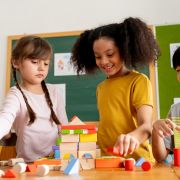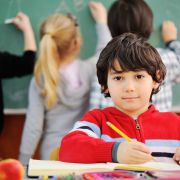
Education
Education can shape an individual's life, both in the classroom and outside of it. A quality education can lay the groundwork for a successful career, but that's far from its only purpose. Education—both formal and informal—imparts knowledge, critical thinking skills, and, in many cases, an improved ability to approach unfamiliar situations and subjects with an open mind.
Some of the pressures of modern education, by contrast, are thought to contribute to the increased incidence of mental health challenges among today’s children and young adults. Examining current approaches to education—and identifying the ways in which they may be counterproductive—can help parents, teachers, and other stakeholders better support students’ well-being.
To learn more about helping kids succeed in school, see Academic Problems and Skills.

Scholars and philosophers have debated the purpose of education throughout history. Some have argued that education was necessary for an engaged citizenry; some felt its purpose was to promote obedience and indoctrinate youth to dominant cultural ideas; still others believed that the pursuit of knowledge was in itself a virtuous or even spiritual goal. Today, conversations around the purpose of education tend to center around child development and the economy—that is, how education can help children grow into healthy, competent adults who are able to support themselves financially and contribute to society. Some experts warn, however, that excessive focus on the economic and pragmatic benefits of education deprives the process of joy. Humans—especially children—are natural learners, they argue, and learning may be most valuable when it’s pursued for its own sake.
Education, broadly defined, is valuable for teaching children the social, emotional, and cognitive skills needed to function in society. Formal education is thought to facilitate social learning, build executive functioning skills, and allow children to explore subjects they may not naturally be exposed to. Informal education typically allows them to cultivate their own interests and learn self-direction, itself an important life skill.
Ideally, in the modern world, education will teach both the technical skills needed for future success and cultivate the critical thinking abilities that allow humans to creatively approach problems, engage new perspectives, and innovate in an ever-changing world. Whether the current system of formal education does that effectively, however, is a source of great debate among the public and policymakers alike.
Most policymakers and educational psychologists agree that some kind of formal education is necessary to function in the modern world. But many experts argue its hyperfocus on grades, testing, and following a set curriculum, rather than children’s interests, can actually be counterproductive and interfere with the natural learning process that more informal education approaches often provide. Excessively rigid schooling is also thought to contribute to heightened anxiety among children, especially those who fall behind or are otherwise non-normative.
Homeschooling—in which a child is not enrolled in a formal school, but instead is educated by their parents or with other homeschoolers—has both strengths and drawbacks. Some common benefits reported by families include increased flexibility in what is studied, the ability to pace the curriculum to a child’s needs, and a supportive learning environment. Potential cons include reduced opportunities for socialization, limited diversity in the opinions and subjects that a child may be exposed to, and an emotional and intellectual burden placed on parents, who may struggle to keep their child engaged or update their own knowledge to ensure they’re imparting useful, up-to-date information.
Grades can be valuable tools in determining which children grasp the material and which are struggling. But despite widespread myths that good grades are necessary to succeed in life, high school and college grades do not necessarily correlate with long-term success. And hyperfocus on grades can have profoundly negative effects, as students who pursue perfect grades at all costs often struggle with anxiety, depression, or feelings of burnout.
Highly-ranked colleges are widely assumed to confer lifelong benefits to attendees, including higher incomes and more prestigious, satisfying careers. But this isn’t necessarily true. Indeed, evidence suggests that, when controlling for prior socioeconomic status and academic achievement, attending an elite college makes little difference in someone’s later income. Other research suggests that the type of college someone attends has no effect on their later life satisfaction; instead, having supportive professors or participating in meaningful activities during college best predicts someone’s future well-being.

Teachers, parents, and society at large have debated at length the criteria that denote a "good" education. In recent years, many educators have attempted to develop their curricula based on research and data, integrating the findings of developmental psychology and behavioral science into their lesson plans and teaching strategies. Recent debates have centered on how much information should be tailored to individual students vs. the class at large, and, increasingly, whether and how to integrate technology into classrooms. Students’ age, culture, individual strengths and weaknesses, and personal background—as well as any learning disabilities they may have—all play a role in the effectiveness of particular teachers and teaching methods.
The idea that education should be tailored to children’s different “learning styles”—typically categorized as visual, auditory, and kinesthetic—has been around for decades. But research has not found that creating targeted lessons based on children’s learning styles helps them learn more effectively; some has even suggested that characterizing children as having one particular learning style could be unfairly limiting, and may stop them from tackling tasks outside of their comfort zone.
Children are by nature highly active, and an inability to move throughout the day often triggers inattention and poor mood—neither of which are conducive to learning. And moving during learning, not just before or after it, has been shown to be similarly beneficial; children who are allowed to move in class learn better, research shows, paying more attention and achieving higher outcomes.
Whether homework is beneficial is the subject of debate. Proponents argue that homework reinforces lessons and fosters time management and organizational skills. Opponents argue that excessive homework has been correlated with lower scores in critical subjects, like math and science, as well as worsened physical and mental health. Most experts argue that if homework is assigned, it should serve a specific purpose—rather than just being busywork—and should be tailored to a child’s age and needs.
In general, evidence suggests that online-only courses are less effective than courses where students are able to meet in person. However, when in-person learning is not possible—such as during the COVID-19 pandemic—well-designed distance learning programs can bridge the gap. Research indicates that online programs that mix passive instruction with active practice, and that allow students to progress at their own pace, tend to be most effective.
Depression, anxiety, and other mental health disorders appear to be significantly more common in today's college students than they once were. Nearly 1 in 5 university students suffer from anxiety or depression, research suggests, and many colleges—particularly larger ones—will face at least one student suicide per year. The reasons for this are complex, experts warn, but may be due to factors including the increased prevalence of social media, the financial and academic stress of college, reduced economic opportunity upon graduation, and decreased resilience among today's youth as a result of parental over-involvement.

The world is changing rapidly, and so are children’s educational needs. While many people agree that education should prepare children for a competitive global economy, there has also been a push to recognize that children's well-being should be taken into consideration when planning curricula and structuring the school day.
To this end, parents and educators are confronting pedagogical questions such as: What is the optimal time to start school to make sure students can learn effectively—and get enough rest? How many and what kind of breaks do students need during the day? What are the best ways for students to learn, and do they differ depending on the subject being taught—or the students themselves?
In some of these areas, big changes are already taking place. Some states, for instance, are considering or have already passed laws that would delay school start times, making them more conducive to children's sleeping schedules. Other states have passed laws requiring recess, ensuring that children have access to physical activity throughout the day. These reforms, along with others, aim to protect children's physical and mental health—in addition to making them better able to focus, learn, and grow.
Many experts now believe that starting school later—typically after 8:30 A.M.—is better for children than starting earlier. This is particularly true for middle and high school children, who naturally sleep later than adults and may struggle to function if made to wake too early. Many school districts have implemented later school start times to account for this biological reality.
First and foremost, school recess provides the physical activity that is critical to a child’s physical and mental health. But recess is also an opportunity for children to socialize without (excessive) adult interference, which allows them to learn cooperation and conflict resolution skills.
Kindergarten and preschool programs are increasingly focusing on teaching children academic skills like math and reading. But evidence suggests that because children are not yet cognitively or emotionally equipped to handle most academic material, such early academic training can produce lasting harm. Some research has found that children in such programs do worse over the long term than children who spent preschool and kindergarten playing and socializing.
Children and young adults today are significantly more likely to experience mental health problems—especially anxiety and depression—than in decades past, and many will require mental health interventions at school. Evidence suggests that schools of any level can best support and help treat students with mental health disorders by proactively identifying students who need help, fostering a school culture that makes mental well-being a priority, and working to decrease stigma surrounding mental health care, both among students and their families. For students without diagnosable mental illnesses, schools can still be supportive by ensuring workloads are reasonable; providing opportunities for movement, creativity, and social connection; and reminding children, teenagers, and young adults that it's OK to ask for help.














